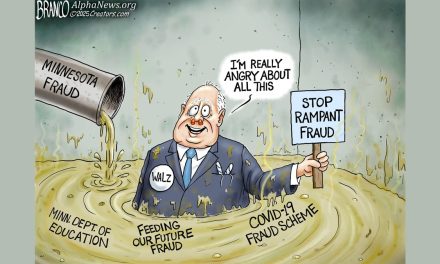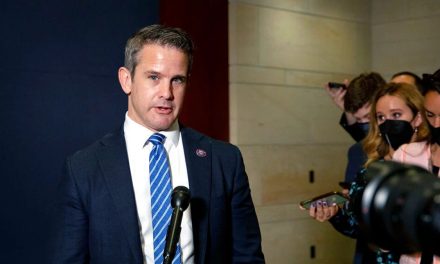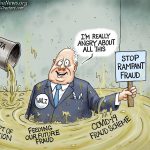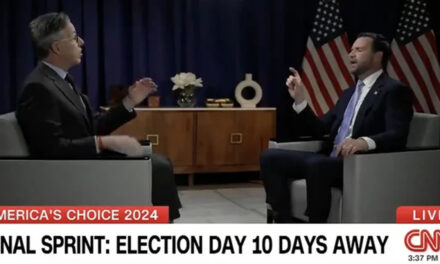
Genetski Calls Debt Ceiling Deal a Win for McCarthy

I am not the only one who sees the debt ceiling deal as a win for McCarthy. Economist Robert Genetski laid it out so well that rather than use his recent report as research, I will simply repost it – as I have done some of his past writings. No one explains economics better.
How the Debt Deal Will Impact the Economy
The debt deal between President Joe Biden and House Speaker Kevin McCarthy (R-Calif.) allows the federal government to continue functioning for the next year and a half. To make the agreement, both sides conceded what they believe are important issues. One thing the agreement provides is a clear picture each party envisions for the future role of government in our lives.
The Debt Deal
McCarthy did achieve several concessions from the president. The most significant was a $50 billion reduction in nondefense discretionary spending for fiscal 2024. The president also agreed not to spend $30 billion in as yet unspent COVID funds. Hence, it appears the main impact of the deal will be to reduce federal spending by a total of about $80 billion from what would have been spent in fiscal 2024.
Viewed from the perspective of the surge in federal spending beginning in 2020, the impact of the debt deal on spending is modest. Federal spending was $4.5 trillion in 2019. The surge in spending in 2020 brought it to $6.6 trillion. A combination of this increase and a decline in the economy brought federal spending from 21 percent to 31 percent of gross national product (GDP).
Despite a recovery in 2021, federal spending increased to $6.8 trillion due to a combination of COVID spending and the initial stages of the president’s “Build Back Better” legislation. Although GDP rose by a sharp 7.50 percent in 2021, the surge in spending kept the federal share at a too-high 30 percent of the economy.
The Congressional Budget Office report on May 12, 2023, estimates federal spending in fiscal 2023 at $6.4 trillion, or 24 percent of GDP. By cutting $80 billion from current legislation, the debt deal reduces the estimated federal share of spending in 2024 from 23.5 percent to 23.2 percent.
Many Republicans will be disappointed with this small change in direction. However, elections have consequences. With the Democrats in charge of two-thirds of the government, there are limitations to what the remaining third can accomplish. From this perspective, the House Republicans were at least able to trim a bit of the excess federal spending from recent years.
In addition, McCarthy was able to increase the leverage the House has over appropriations. The debt-ceiling agreement provides for a 1 percent cut in all discretionary appropriations if Congress fails to pass all appropriation bills by the end of this year. This 1 percent cut in discretionary spending would cut another $18 billion from the 2024 budget.
Perhaps the most important thing McCarthy was able to accomplish was to lay out a vision for the future expansion of the federal spending and regulations. Even so, on its current trajectory, federal spending will remain at least 23 percent of the economy.
The Negative Impact of Excessive in Federal Spending
My book, Rich Nation, Poor Nation: Why Some Nations Prosper and Others Fail, documents major cycles of prosperity and failure. One characteristic of U.S. policy failures has been cycles when federal spending grows faster than private spending. Since 1900, there have been four such cycles. During each of these cycles, living standards were flat or down. Beginning in 2020, the United States has entered the fifth cycle of excessive federal spending.
When government increases its share of the economy, it automatically reduces the share of spending to the private, productive sector. The result has been a deterioration in the nation’s productivity, which is down 1 percent this past year. Without an increase in productivity, living standards will continue to decline.
To reverse the economy’s current malaise and redirect policies and to increase living standards, the United States must engage in a major effort to reduce federal spending as a share of the economy. Modest 1 percent growth in discretionary spending won’t be enough. Past failures to control federal spending have increased the nation’s debt to the extent that we will spend more for interest on the debt than on national defense.
The wrongheaded belief that federal spending provides an inexhaustible solution to economic problems should come to an end. As interest on the debt becomes an increasingly large component of mandatory spending, it will crowd out one after another government programs. Attempting to pay for these programs by increasing taxes is not a viable option. Tax increases directly reduce funds to the private, productive sector.
For the United States to return to a healthy economy with rising living standards, it will be necessary for federal spending to decline as a share of the economy. Only then will the private sector have the resources necessary to raise productivity and restore the type of prosperity Americans have come to expect.
***
So, there ‘tis.





























Robert Genetski is the Allegan County Clerk and Register of Deeds in Michigan. He is a former member of the Michigan House of Representatives from 2009 to 2016 when he chose not to run again. He spent a decade as a teacher; he holds a BA and MA in education from GVSU whose enrollment is actually falling. In 2012 he was found guilty of driving while intoxicated after pleading innocent.
He agrees with Larry that McConnel is a debt ceiling negotiation winner. Perhaps those who think alike, drink alike too.
Frank, Would that list of drinkers also include Paul Pelosi and his gay lover? Seems like you are attempting to discredit this fellow (whom I never heard of)? Most of us whom brag about our good conduct can only do so because we have never been caught.
According to *https://www.bestcolleges.com/research/college-enrollment-decline/* college and university enrollments are down 8% since 2019. I checked GVSU enrollment statistics. GVSU enrollment is down 9.7 percent from 2019 to 2023. So it appears they have been affected by the pandemic much like many colleges and universities. From 2021 to 2023 their enrollment has only declined by 2.7%. This is all about average and as you would say, “is a nothing burger”.
What college are you from Frank? Would it be ok if I judge you based on your college’s enrollment since 2020?
Seems like Robert Genetski teaches at liberal colleges like University of Chicago and New York University. You like these places don’t you?
I do wonder if since 2020, college enrollments are down because of Biden and his failure to get we the taxpayers who paid for our own educations to pay for student loans of others?
What does GVSU’s enrollment falling have to do with this man’s accomplishments?
Well it seems like you took a swim in the pool of petty gossip, reached down deep and dug up a DUI. So to create balance, I am responding with a more accurate summary of the man. (I noticed he was an economist for Epoch Times for a while, and I know you do not like them.)
Actual resume for Robert Genetski (a fellow Pollack), here is what you did not include:
Robert Genetski is one the nation’s leading economists. He is a teacher, columnist, and author of 5 books on classical economic principles. His latest book, Rich Nation, Poor Nation: Why Some Nations Prosper While Others Fail, provides over a century of evidence documenting the success and failure of various economic policies.
Genetski is a popular speaker known for using humor and anecdotes to simplify complex economic issues. For five consecutive years, speaking.com named him one of the top-five speakers in the field of economics and finance.
For the past 25 years his consulting firm, ClassicalPrinciples.com, has provided economic and financial research to individuals and businesses around the world. Genetski writes a regular column for The Epoch Times. His articles have appeared in numerous publications including Fortune Magazine, the Wall Street Journal and Investors’ Business Daily. He has appeared on CNN and Fox News and on nationally syndicated radio and TV programs.
Dr. Genetski has taught economics at the University of Chicago’s Graduate School of Business, New York University, and various other institutions of higher learning. He has held various positions in the financial industry, including Senior VP for a major Midwest bank, money manager, investment advisor and director of investment research and has served as a Director on the Boards of various public and private companies.
Seems to me like this guy is a guy that might be worth listening too!
It’s a different Genetski. A joke.
Frank Stetson …. sorry … you are not going to get away with that lie.
Oh. OK. I do not get it but nevertheless….. How ironic that both went to GVSU, had advanced degrees, etc.
Tom .. they did not both go to Grand Valley State University in Grand Rapids. That was the son. Frank ignored all that stuff on the Internet about the father and posted what he thought was a negative posting about the son. It was a cheap shot misdirected — with a closing insult to boot.. A real knee slapper.
Tom … Frank’s comment was a childish low-life cheap shot made even worse by the fact he is talking about THE WRONG GUY. So much for Mr. where’s the facts? Frank has become the master of projection. He is the worst example about that which me most complains. And all that making stuff up. Notice how he intimates I may have a drinking problem. in fact, I drink a glass of wine with a fine dinner about two or three times a month. That’s it. But he makes up a different Larry Horist and then attacks his imaginary play mate. I would not attack Frank for drinking — or even imply such a thing — since I do not know if he is a teetotaler or a drunk. I am hoping for the latter since I would hate to think all the crap he writes is the product of his sober mind.
LOL Good one Larry, and deserved on this one. Yes, I would never ask a persons drinking habits nor would I particularly care. That is why I made the comment about Paul Pelosi. I seem to recall he got a DUI which enjoyed notoriety.
I often check out your assertions and Frank’s assertions because as an independent I like to understand the breadth and depth of both sides of an issue. And I suppose I fell for the joke or something, not sure. But I did check your Robert Genetski, viewed him in the alumni section of GVSU. And I read his bio. I also checked out the enrollment statistics which they post on line.
Your Robert Genetski seems like someone I would be pleased to hear sometime. I am sure he knows a whole lot more than me. I may look to see if he has anything on Youtube. I may not always agree with intelligentsia like Robert, but they do have interesting thoughts. I think his comment about the interest on the debt being mandatory spending was spot on. And it should not matter whether we are conservatives, moderates, or liberals. And honestly, I think the liberals really need to understand what this man is saying since liberals tend to like to start new programs more than conservatives. We can only exact so much in taxes before we will have to begin cutting programs that might affect you and me. Government often does not cut the program but they gut the program by raising requirements, lessening services detailed by the programs literature. We all need to be wary of national debt and start thinking the need to pay it off. Thanks for this post Larry.
I think University of Chicago and NYU are sort of liberal higher educations entities aren’t they? That was what confused me most about his post. I looked at the list of the 15 most famous speakers at GVSU, and they seemed to be Dems.
Frank Stetson … I feel I must respond when you spread ignorant slander and misinformation. The economist I referred to has a long and distinguished record and has published several important books on economics. You can find his impressive biography all over the Internet. If you really did honest research, you could not possibly have missed the volumes of information on the Internet. Instead you appear to have only selected a brief posting on Wikipedia that appears to be referring to his son. It is definitely not him. Knowing how you research, I do not think it was an honest mistake. Your modis operendi is sarcastic insults and disinformation. In this, you have reached a new low. Congratulations.
Wow, trifecta off topic from Larry, who apparently self-announces how he can dish it out, but certainly cannot take it.
Thanks Larry for “woking” us to your extreme sensitivities about this. Yet, everything I said was correct, just the wrong guy with the same name. And I fessed up to the joke ASAP, just should not have ever been uttered, according to you. Sorry. I am sure both these fine fellows of the same name are just great guys that would not be totally put off being mistaken, for a nanosecond, for the other. But I am very sorry to have hurt you.
But Larry, really, did you actually mean: “I would not attack Frank for drinking — or even imply such a thing — since I do not know if he is a teetotaler or a drunk. I am hoping for the latter since I would hate to think all the crap he writes is the product of his sober mind.” Because this sure seems like Larry’s backhanded way of calling me a drunk, which he claims “I would not attack Frank for drinking — or even imply such a thing” as he implies EXACTLY that thing. Kind of like the joke of same name, different resumes, eh?
Some recent “Larryisms” from the Horist’s mouth.
“ I fail to find an intelligent sentence in your entire posting. You sound like an angry drunk.” 6/1
“You posts remind me of the old story about the drunk using the lamp post of support more than enlightenment” 6/3
Although not as prolific as Joe in attempted drunk shaming, contrary to Larry’s statement, he does it all the time, he even did it the very post where he notes he never does it. Think that’s chutzpah defined, not humor.
For the record, rare drinker, beer n wine, but mostly wine. Hard liquor – never, and haven’t had a drink in over a year. Yes, I have been a drinker, my joke when pushed as to why is: “I am waiting for you all to catch up.” Intemperate youth, I began drinking at 13, gave it up for a year, and picked it up in earnest at 15. I have drunk-stories galore, including one with around a dozen cop cars, a roadblock just for me, waved away from the cop for stinking of beer, and then totally let off the hook after running all lights and stop signs for 15 miles of city driving. Not pretty, not proud, would not recommend it, stopped at 22 after a horrific auto accident that I barely survived as a drunk passenger with a drunk driver meeting a HUGE very sober tree at 45mph in the middle of nowhere. I have been the designated driver ever since with a 15% disability in my right arm. Another story, not as funny as the kidnapped-kid-gets-in-a-flip where alcohol saved the day, probably. But — my intemperate youth ended at 22 with only one occurrence, with my wife to be, and that was her fault to ask: “what’s a boilermaker….” The woodstock generation often followed the beat of a different drummer in this.
However, my FIL was the sommelier at some swanky NYC hotspots in the 60’s and 70’s and hey, not gonna pass up that experience. Not to mention the rat pack, lbj, Sinatra and other stories….. But never more than a glass or two, usually one small one.
Love to discuss issues sometime. Granted I only posted a joke so not on this one; I used your previous one instead. This guy is good, spot on with the facts, just don’t agree on the conclusions, or lack thereof in some cases. But he’s a smart guy, no doubt.
And I am truly sorry that you can’t see the humor, I am woke to your sensitivity now. But remember, I told you I would respond if you keep up the personal attacks. I returned volley, very lightly, and you went off the reservation, all personal, some very mean, topping my comment by far. All the drunk jokes by you in the past that you can’t even remember as close as last week, and this one make my response here seem tame by comparison.
Any time you want to stick to the facts, I’m your Huckleberry, and not a fermented one :>)
Frank Stetson. You make me laugh. Such a locoing whiney defense. And you usual projection. Accusing me of “extreme sensitivity” and then you carry on like you are … extremely sensitive” and so very wounded. And all because you made a fool of yourself in misidentifying the Genetski of my commentary. And then you LIE that your mistake was a joke. Really? A joke? You forgot the punchline.
I never realized the level of your obsession of me. You mean you have saved all my past commentaries for reference … since you said there is no search feature on PBP. And you obviously did not compared my comments. I said you “sound like” a drunk and I compared what you wrote to an analogy about a drunk using a lamp post. After so many long screeds, I see you as an intellectual lightweight with an obvious obsession and a lack of devotion to facts and truth. That is why I limit my time responding. Perhaps I would be more inclined to respond to your points if you were not so engaged with describing and debating the Larry Horist you invent in your mind.
However, I do sincerely compliment you in dealing with your youthful folly with demon rum.
Feeling a little defensive Larry? Most of your responses to me are personal, not on topic or any topic for that matter.
Sure, it was not a joke, I really thought you poached a non-economist as your expert. And when I fessed up immediately, of course that meant I really meant it. And when I projected your extreme sensitivity, you proved me wrong by writing another 200 words just about me, my Larry-perceived problems, concluding with your branding me an obsessed fool.
And yes, I did have a season of cuba libre, tyvm, but it wasn’t a demon, it was a friend of the devil was a friend of mine…..
Interesting testimony Frank. I would be happy to have a tea, coffee, or beer with you sometime. I am not big on wine which I only usually have with a dinner, and have not partaken of hard stuff for years and years. About the strongest I might get is Irish whiskey in a cup of strong coffee brew.
You know, we all got a story, and yours is very interesting. What I see in all of it is maturity and victory! And that’s wonderful. Congrats!
I was abused by my mother emotionally and physically for my who childhood. That is why I went into the USN. I considered the possibility of being in the Vietnam War as better than my childhood. I considered the glory of saving my men and dying in the process and getting a medal for it. At least then maybe she would see that I was a good person. Yeah, emotional abuse is a ticket to a really dark low self esteem place! Then in corporate world I was having great successes, all was going very well. But I began to wonder why was it that every time I had a big success, I had to go get shitfaced drunk. I think they call it “binge drinking”. Well I finally figured it out. The outside world was celebrating me and high fiving me, but the inside of me was still dealing with low self worth. To reconcile the outside opinion of me and the inside opinion I had of me, I drank. It was the only way my brain could handle both opinions was to medicate, numb it, until the glory passed and I was a regular guy again. So I prayed and asked God to heal the inside of me that I cannot see so that I can better handle the outside of me that I can see. Well, it worked very well. He is faithful and healed me. And I have been laying my troubles on him ever since. And He has been faithful to guide me though them just fine.
Sorry I did not recognize you were joking. I have to admit, usually your comments are more factual and even if I disagree, they are of value to me. So this one left me a bit bewildered. Thank you for clearing up the matter. :>)
Yes, Tom, I have become an interesting artifact, sigh. Fuckin boomer as my kids say. Another reason not to drink and become overly talkative re: stories of my intemperate youth. Like you, I too, had an interesting parent yet I went the other way from your trying to please. It was the 60’s/70’s, revolution was in the air to be closely followed by over-indulgence. I grew up fat, thin, short, tall, poor, and rich ultimately riding that middle class wave, hanging ten all the way to the beach where I cut my hair and got a job….. Was not rich, so became a pot dealer in with the jock crowd… good market and good friends. Think Adam Goldberg living Dazed and Confused, friends with Pink, gets in fights, loses. Field parties, protests, sex n drugs, fast cars (not mine), crazy times. We even had our own Tee Pee, a real one. Our band became major blue grass band, Joan Jett was there as was Root Boy Slim and the Sex Change Band, and on a bad night, The Hell’s Angels.
My parents did most of the college funding, I said no, I wanna wait, I’m not ready (to give up the life) they said: fine, move out or here’s your bill. So, I went to school, continued my wave ride, found a mentor, re-learned how to study, stopped the dealing, and began to claw my way back to the real world. I never returned home again except to visit and so left college on my own. In college I worked up to 3 jobs at a time to prepare for end of college, and my place had a 30-40 living area with a full roadside sign version of the coppertone lady on the ceiling. Our parties were legendary. The coppertone girl portion, with her little dog, was on my bedroom door :>)
I blame my father for my mental torture, cannot unblame him, but in the past decade, having done a good deal of genealogy, I now know some of the things he went through, it was beyond tough, much tougher than most of us have seen in our lives, and certainly, my stories don’t hold a candle. We came from working class poverty, work is why we came to the steel mills of Conshohocken and the mines around Scranton; we progressed to homesteading in Arkansas, a Maytag store in the hard-scrapple side of Norristown, my parents being the first on to hit the middle class partially due to the GI Bill. My grandmother would come home on Friday with the groceries and say: “good eats tonight,” a happy phrase in remembrance of her nights without.
And I got on my surfboard and began my college ride, not exactly continuing the trend of hard work and success of my parents, but in the end achieving a little of both. She was five when she came over.
In college, I left my intemperate youth behind, starting with a myriad of legal schooltime work and entrepreneurial efforts (I discovered sand-art terrariums had more margin than pot) and then, construction after college, and finally, into the office where I became an industry guru focusing on a market nobody else cared about. Low n behold, that sector took off, I was there, now I am here. Yet I tired of telling others what to do in consultation and then watching them fuck it up so I moved into a major corporation with my new wife and soon, family on the way. There, I finally grabbed a P&L as a hired gun, managing other’s money and business for profit. And then I could fuck things up myself :>)
I never reconciled with my father. If I have known then, what I knew now, I would have been more understanding, but too much water to ever reconcile. I wrote up his war years, was going to post them on Memorial Day, but didn’t. Suffice it to say The Greatest Generation makes us look like self-centered babies who never faced real adversity and are so self-absorbed that we bitch about a mask and a shot as political and social statements rather than community interest. My wife’s was a more “normal” family life, her mom’s side came before the Mayflower, and her father was a worldly man of the sea from Genoa —- my adopted father too. While a true European gentleman, his story gives my father’s a run for the money. These folks were really interesting, I am just a cute anecdote next to them.
So thanks, and I understand, really understand, what you were saying, and feeling.
Remember this Tom: distressed children make the most interesting adults.
We’re not broken, we’re interesting :>)
Wow, you said a lot of things that I remember! the 1960’s was a pretty wacky decade where just about anything was acceptable in some form. Things were slow in coming to Reading PA. Its that steady PA Dutch culture; its very slow to change or accept outside ideas. So I did not get involved in much of what went on in many areas of the country. Yes our father’s often paid a dear price. My father was raised in Ambler Home for Boys (I believe now it is Amber Home for Children) from the age of about 8. He ended up in the home for boys because his mom left his dad due to spousal abuse. He had it tough but he was very interesting how he would always seem to turn adversity into opportunity. He had a real gift to see a path forward to success in anything! I am fortunate that some of him rubbed off on me! LOL
I know the miner’s plight very well. My family worked the mammoth vein too. I used to know Scranton very well and have been to the “Anthracite Museum” up there in PA. I agree. We really do not have an appreciation of how tough they had it. And certainly we would honor them by not complaining so much. I was all in favor of masks and shots because I figured if nothing else, I was helping my fellow American stay safe. And that’s one thing you and I have always seemed to be in agreement with is that we want to see our fellow Americans do well. And Larry wants that too. We just have different and interesting ways of how to get there.
Your story is interesting, and proof that we have a great country!
Well done!
You are correct, “We’re not broken, we’re interesting :>)” Well said!
You are correct Larry, he was easy to look up. And you are correct about his bio. And yes, he is all over the internet.
Tom … and yes …. Frank was not joking IMO.. In fact, it is not even close to a joke. He came up with that bit of fiction only after he discovered his error.
are you projecting again Larry, as usual, as is your normal manner…….
Larry, I am not particularly strong on theories of economics but it seems to me that the second paragraph from the end is the most important paragraph for all of us to understand. When I read this paragraph, the lightbulb really went on for me as to why we need to stop accumulating national debt and start paying it off. Also, why Trump was so bad for us when he piled on $6.8 T of national debt and kicked off the spending spree that Biden then put on steroids.
The paragraph goes: “The wrongheaded belief that federal spending provides an inexhaustible solution to economic problems should come to an end. As interest on the debt becomes an increasingly large component of mandatory spending, it will crowd out one after another government programs. Attempting to pay for these programs by increasing taxes is not a viable option. Tax increases directly reduce funds to the private, productive sector.”
Where I disagree with Mr. Genetski a little is his statement about tax increases reduces funds to the private sector. Since the fundamental reason for taxes is redistribution of wealth, it seems to me that taxes take money out of the private sector but those same funds can be distributed back to the private sector in exchange for goods and services. So it seems to me that there are “good re distributions” and “bad re distributions”. Good re distributions would be for goods and services that create jobs and promote more economy. So it would seem that Biden’s Build Back Better would be one such program. Bad re distributions would be programs like Welfare, SNAP, etc that are necessary but do not provide any economic gains.
So in the end, it seems like McCarthy’s win (if you can call it that) is a very tiny wind, a drop of water compared to an ocean. So I find it hard to call it a win. Looks more like a tie to me!
Tom … I see it as a win because got more budget reform than any previous debt ceiling deal. And I do believe if Biden stuck to his clean bill position, McCarthy would have had to cave. Neither party is going to allow a default. That was proven by the size of the vote in the house. It was a game of chicken and Biden veered to the right at the last minute. But your are correct. It could have been better theoretically. Both sides came away from their original positions. That is how negotiations work. I just think McCarthy got closer to the Republicans’ initial demands than Biden’s opening gambit.
I agree with you Larry. He did get budget reforms and that is a good thing, a win for sure. My feeling is that had McCarthy caved now, and had he listened to Biden to do a clean bill and negotiate in the budget process, I think McCarthy risked much more. I think Biden’s approach was to lure him into quick clean bill, negotiate later, then later comes (September budget process) and Biden stalls or blames GOP for a government shutdown. I think it was very smart to send an approved budget to the Senate and Biden because it put Biden the Dem run Senate on the spot, kind of like a checkmate in a scenario where neither party wanted to be labeled with a government financial default – that would have hit their 401K’s too!
A side note, I did find a keynote address and a lecture on his book on youtube. I intend on listening to them to know more about him. Thanks!
Tom … Exactly. You me and Genetski seem to agree on who came out ahead in the debt ceiling deal. And I am sure you will find Genetski’s lectures very interesting and informative. No one explains it better.
IMO, you are spot on with “his statement about tax increases reduces funds to the private sector. Since the fundamental reason for taxes is redistribution of wealth, it seems to me that taxes take money out of the private sector but those same funds can be distributed back to the private sector in exchange for goods and services. So it seems to me that there are “good re distributions” and “bad re distributions”. Good re distributions would be for goods and services that create jobs and promote more economy. So it would seem that Biden’s Build Back Better would be one such program. Bad re distributions would be programs like Welfare, SNAP, etc that are necessary but do not provide any economic gains” more or less.”
More in that his concept only works if you have the preconceived paradigm that the private market is more productive than the public market harkening all the way back to The Great Depression when we “hired” five guys to dig a hole with one in the hole and four leaning on their shovels. Given that the private sector, by definition, does not even spend all investment in America and the government, by law, must attempt to Buy America, which private industry does not sort of means that for every dollar spent, private market spends a greater percentage OUTSIDE the US, whereas the Federal Government spends a greater percentage of said dollar INSIDE the US. Now given the gov’s law is for +10K purchases, and that spending money overseas may profit US companies, it gets pretty muddled, but there is no proof that the government is inherently less advantageous to US GDP than the private market.
Case in point: solar industry government spending has created an expansion that private spending could not because they would not. EVEN the famed Solyndra loss came from a very profitable program that undoubtedly turned into productivity gains that the private sector did not accomplish. While I think he’s got a point, I don’t think it’s the only thing working here.
He also states: “Tax increases directly reduce funds to the private, productive sector” where I am sure the word “directly” is wrong but plays to his mostly conservative audience. Case in point: rich guy gets taxed a dollar; that dollar was heading to a t-bill investment in the US that funds our debt or government spending. Get it? OR rich guy gets taxed a dollar that was heading to an investment in US steel which is building a new plant in Mexico. Instead, gov gets the dollar and buys steel from US steel.
Bottom line: I am still a debt/GDP ratio metric sort of guy since it focuses on debt, the issue at hand. It too concludes our spending is too high, deficits and debts need reduction and not only is the debt maintenance an issue, but investor reaction is the lynchpin potentially crashing our economy if we don’t fix it.
So we end up sort of in the same place for different reasons and I want to understand more about Genetski’s theories.
I agree with you less about “Bad re distributions would be programs like Welfare, SNAP, etc that are necessary but do not provide any economic gains.” Tom, Tom, Tom —-> the ole welfare bums paradigm…. SNAP buys food; is not food an industry with economic gains? Welfare buys heat and home; no profit there? There’s also soft profits like when you pay SNAP, a bad guy does not bop you over your head to steal your wallet to buy some food….. I agree that the soft profits are soft…..but think we all can agree there is something there. IOW, starving barbarians at your gate is less profitable than SNAP.
Sometimes we need to overcome our stigma’s, myths, notions, and look at the circle of economic life, for which none of us can foresee the future or collateral advantages and damages, for decisions made, to gain some clarity.
As it has always been: a good investment, or a bad investment, can occur EITHER in the private or public markets, especially when the public market is constrained to US purchases, mostly. While taxes and tax levels are important, more important is the return we get on every dollar spent. The setting of goals, metrics, and the measurement of such to provide fodder for improvements is the real failure of our Congress and State Governments. While they have their version of the “business case,” I question whether they often check the results regularly unless stumping for some reason.
So I agree that government spending can advantage the US GDP, I disagree that public service payments are 100% cost only, and suggest what’s missing here is not only setting an ROI goal, but hardly ever monitoring, measuring, to the point of taking corrective actions. We usually just push the puck across the ice. Like Trump’s wall: was it profitable or just cost? Biden’s 2021 stimulus: profitable or just free money? These are good and answerable questions, but we just push the puck.
Yes Frank, I sort of think you are making my point that taxes can be redistributed to put the money back into the economy. Perhaps the SNAP example was not the best. You are correct in that I would prefer SNAP over barbarians beating me up for food money. I think what I was trying to say is that tax money used for SNAP produces minimal gain (not including the barbarian angle) while building a highway or a city wide internet has the potential of producing more gain. Maybe a better example of tax money being redistributed for no gain might be the tax money needed to service mandatory spending like the national debt interest. Seems like that truly is money going out of the system with no guarantee that it will come back into our system.
My bro is one of those rich guys. I would say that rich guys invest where the money will grow the best. And that is not always bonds. It may be in a US company or it may not. The problem is that even if you invest in a US company, you do not know if the materials they purchase are from other US companies or from foreign countries. For a long time, automobiles have been a good example of this. My American Corvette has a lot of Mexico and other countries in it. IT may have been built in the USA but it’s parts make it an international car. Ford is the same way, many parts from Mexico and now batteries from China but built in VA. Whereas government is supposed to buy American, but they often don’t either – which is how the Huawei stink started. Had the government simply purchased IBM, HP, or Dell they may not have had that whole mess. Same with smart phones, electronics in general, home appliances, and many more things. Our manufacturing base has been severely eroded. I was microwave oven shopping the other week. No matte what the brand, they all were made in China, and that includes GE. When I worked on the SOSUS naval program in the 1980-90s, it was exactly as you say, we had to buy USA. Only in special cases where there was not a US expertise could we buy foreign. From what I am seeing, and reading, the US Government is purchasing a lot of foreign products these days.
So it makes me wonder why Dems were screaming about Trump’s wall. I know they were screaming because they want a more porous border, but in essence, it was US steel and US workers building that wall, so it was really a good thing, right?
Personally, I liked the wall. China got one, and its a big darn wall! The Pope was against the wall but I wrote him about it and asked why he was against it since the Vatican has a wall around it. He never responded.
I agree. Congress needs to require of itself more accountability and money allocations should come with SMART goals. All of the programs that I was a part of had milestones, progress goals and payments, etc.
Tom, you be a good reader, so here’s some “why snap is profitable” stories. I admit, the profits are “soft,” but think of it as directional. It would be nice if we really put some statistics behind the theories:
*https://www.slate.com/articles/business/moneybox/2014/04/big_box_stores_make_billions_off_food_stamps_often_it_s_their_own_workers.html*
And another from the government (whose sites have magically gotten better lately under Biden: try *airnow.gov*, you will love it, I found it invaluable lately :>( I’m at 25 and green today — yippee) but here’s the snap:
*https://www.ers.usda.gov/amber-waves/2019/july/quantifying-the-impact-of-snap-benefits-on-the-u-s-economy-and-jobs/*
Somewhere, out there, there’s a study on how it stops crime, turns kids around, etc. Still soft, very soft, but interesting perspective.
Servicing the debt is a waste you say. Not so fast, Spanky, it depends. Being silly, let’s say I am the US, take a loan, invest in Apple before the first iPhone: would the interest I pay be covered by the profit of the investment? Silly example, but you get my point: not only does it depend where I invested said loan, but it is measurable. And that’s the problem, these dumb fucks In Congress rarely measure versus kicking the can down the road, digressing into hyperbole and emotional arguments, and forgetting the job of budgeting requires you to assess your actions. Just like a business.
FYI: all greenbacks ultimately can only be redeemed in one place: the USA. So, it’s not so much how much you spend overseas, or get loaned from overseas, what matters is what kind of a deal you strike for redemption. Let’s same some China guy loans you three billion. But he buys some corn from you where you charge him 20% more than US buyers. Hey, made more than you paid — good deal!!! My econ professor used the example: you have a piece of worthless green paper you hand him and he gives you a sweater. He’s got paper, and you are warm with a real sweater. And the only place he can spend that paper, ultimately is in your store. And he has to be nice or your store might go out of business. Loan sounds like a better deal now, eh? It depends…… And what it really depends on is what you spend it on and the profit you get in return. Profit better than interest, great deal. Profit less than interest, hope you really needed it, because — bad deal.
Yes, the government tries to buy US, Biden has an EO trying to up that from the guy whose name we can not mention :>), and you mention the incidences where they don’t. But that’s normally because they can’t. As to the wall, good example. Yes, it is profitable to hire US guys to do it. But the question is, in a world of limited resources, are there other investments with greater returns. My take is yes, but really am guessing. But that’s the point —- it’s not only the dollars we spend that’s important, it’s the return we get as well. I will take loans all day IF I can make money on it. My first new car, I leveraged the money from my bank account, got a loan for about 2% over prime, a great deal, and in the end —- had a car, had the money for a car still in the bank, got to drive that new camero for years, but most important, established a credit history when I had none. To me, that’s a profitable loan and much more so than if I just handed over the cash, which I could of. OH, and FYI: it was in the time of Carter, I was making 15% on the CD…..funny though, I was young, thought it would last forever, needed to remain liquid since figured I be fired tomorrow, so signed up for 12 mth cd. And, of course, 15% — never again. Anecdotal, not statistical, but an example of how loans can be profitable.
I invest, but I really don’t look for green or other companies that suit my social program conscious like 100% US, etc. I have long bashed folks who do because it’s an additional expense for little gain (there’s not enough green companies out there yet). I don’t care what the managers do in their bedrooms either. If I invest in a US company and they invest in China, that’s on them, I invest in them, I look at their books. And with mutuals, I really don’t track the exact companies invested in, I look at the fund, the fund managers, etc. I may glance at the companies, sectors, etc. but it’s not a driving force. But, having learned the hard way, I invest in companies doing business in China, not Chinese companies —- they cook too many books still.
FYI: the Great Wall of China did not work that well, the barbarians came through the gate anyways. It was effective most of the time, but not all of the time, especially against a large-scale attack. Good at the riff-raff, but not so much the “Cartel caravans.”
Frank Stetson … I gave this one a quick scan … the usual repetitions and bullcrap — but two things stood out. You reliance on government reports as the epitome of accuracy. Any one who has studied economics knows that such reports have to be put into perspective and judged against more independent analysis. After all, the government is a interest group with issues of bias.
FYI … You reference to the “Barbarians” and the Great Wall of China is a historic mismatch — location and dates. The cliche “the Barbarians at the gate” refers to the Visigoths entering and sacking Rome in 410. The Great Wall was constructed (Begun) in 220 B.C.. It was not breeched by the Mongols until 1200 A.D. So it worked for about 1400 years. Your welcome.
You gave it a quick scan? Don’t do me any favors, please. “usual repetitions and bullcrap,” NAME SOME….
You’re joking again, of course when you say: ” Any one who has studied economics knows that such reports have to be put into perspective and judged against more independent analysis” he says about ALL government reports. Of course, he could say the same about any report, from anyone, but again, as usual, leans upon his reader’s general feeling about big gubermint be bad…. Of course, as usual, you have NOTHING specific to pick on, you know, like using facts to disputer, but instead just the broad brush: Larry no like so it must be bad bad. Larry says so, so there tis is.
“epitome of accuracy?” DId you pull that from your ass? I said nothing but take all this stuff as soft numbers, with a grain of salt. And then you go off the deeper end about the Mongols not being seen as barbarians which you claim I termed as “Barbarians at the Gate” when I clearly said “the barbarians came through the gate anyways.” Project much? ffYou really got your hate on big time to dig so deep for a slam.
Meanwhile, back in the virtual world, we will continue on with real issues……
YOU’Re welcome too.
Finally getting away from the personal, and to the piece. Genetski is a very accomplished economist who now sells his book (shilling for it here even) and writes for The Epoch Times (financed by those with affiliations to the Falun Gong), but has been a talking head for CNN, FOX, Fortune and WSJ, teaches at the finest schools, and speaks a lot, a weird choice all things given. He is a free market, classical economist which is generally thought of as — in the past, but certainly, all thoughts should be considered.
First, on the win. Larry wants to spin this as some sort of major event, but Genetski says: “McCarthy did achieve several concessions from the president” and “the impact of the debt deal on spending is modest.”
Larry thinks: “In fact, no previous debt ceiling legislation went so far past a clean bill with so many specific spending restrictions. This was a historic first” and “I see it as a win because got more budget reform than any previous debt ceiling deal.“ That does not seem to be what Genetski thinks. Nor reality: In the 2011 debt ceiling fight, Obama and Biden agreed to more than $900B in immediate spending cuts and created a joint congressional committee to find a minimum of $1.2 trillion in additional cuts or face sequestration, which they did.
IMO, on this one, everyone won, and everyone lost. Kevin won, Joe won, the country won, and it still is not enough. So, we all lost. See my post on Larry’s other “Kevin is a winner” screed for the tidbits.
IMO, what folks might be missing is that Kevin probably “wins” because Joe might have set it up that way starting in January.
1. Kevin gets the win, but also gets the blame for cutting things some Americans cared about. What’s the win: the chart shows it, not much. What’s the blame: seniors having to work for food stamps, college loan forgiveness, pipe line and permit expedites, all on Kevin even if Joe didn’t mind the cuts….
2. Joe retained all his budget for all of his favorite programs, only got the IRS funding pruned by 25%, who cares about college reimbursement (and we can blame Kevin), the work requirement was miniscule, Kevin can take the blame for the pipeline and Manchin owes Joe for the pipeline. There is absolutely nothing tragic in this for Joe, he will be claiming credit big time by next year for 1) biggest budget for environmental change ever; 2) biggest infrastructure bill in decades; 3) reduced deficits three years in a row, etc. All looks promising.
As I said before, Joe has already reduced deficits for two years running. This budget, 2023, he did not, why? Joe put an inflated IRS budget in, why? Joe took 10 years of cuts during the Obama debt ceiling negotiation; he got two this time which means no more debt ceiling issues until after the election. I don’t know: could Joe have orchestrated this whole thing and even got some blue birds with the Manchin thing, the college thing (Kevin pretty much took him off the hook for a problematic issue), and the two year thing to end up with a budget NOW that is VERY similar to the ones he turned in for the past two years IN REGARDS TO deficit increase, reduction. Pretty hard to say it’s not a possibility.
But the proof in the pudding of Kevin’s win will be what happens with the Freedom Caucus next week. They stopped all votes on the floor last week, with some help from the Dems, but can Kevin really win and get down to doing more work or will, as Kevin himself described it, “the chaos” continue. Time will tell.
Back to Genetski: I found his use of spending/gdp ratio to be interesting. I need more research here to better understand. Yet, think about it: the topic is deficit and debt and Genetski measures that using a spending ratio against GDP — where’s the debt? Where’s the deficit. At best it’s correlation.
His contention is that “One characteristic of U.S. policy failures has been cycles when federal spending grows faster than private spending. Since 1900, there have been four such cycles. During each of these cycles, living standards were flat or down. Beginning in 2020, the United States has entered the fifth cycle of excessive federal spending.” It seems a weird concept, I need to understand more. Private spending includes personal consumption — US and global, but may include other spending elements so, again, I need to research more. For now, I will just treat is as personal consumption.
He concludes: “When government increases its share of the economy, it automatically reduces the share of spending to the private, productive sector. The result has been a deterioration in the nation’s productivity, which is down 1 percent this past year. Without an increase in productivity, living standards will continue to decline.”
I do not know this to be true, nor that 30% is a magic metric where bad things happen, but I am guessing it’s a “correlation is not causation” at best. Basically he is saying that government is less productive than private, and that the investment is a sum-zero game between the two. I think it’s a tad more complex than binary thinking like this allows, but the private/public productivity urban myth does play well with the small government crowd. Again, I need to know more, but I do know that Classical Economics is not for me. While I believe in many of the concepts, I do not believe in a total hands-off, laissez faire, free market. Government has a role in the management of sovereign nation economies.
So we end up sort of in a similar place for different reasons and I want to understand more about Genetski’s Classic Economics theories. Also, I firmly believe the cuts were not enough, we need more. And that we should raise the tax rate on the rich to bring in more revenues; can target them to the debt if they like.
Kevin a win, sure. But “modest,” The US wins, modest again. And Joe is a winner and if he has played it right, will bear fruit before the election. He may have orchestrated the whole affair, there is some evidence as to that, based on his budgeting history.
Yes I agree with you on the laissez faire market approach. It concerns me too. Seems like it can spin out of control rather easily. I am more for a mix of free market and some moderate government controls. I also think a combination of taxes and interest rates hikes should be used to temper the economy. I think we should tax more and raise interest more on the high side of the economic cycle, and release money with more government spending and lower interest rates on the low side of the economic cycle. It seems like free market by itself produces many losers, while socialism by itself seems to destroy incentive and lead to lower standard of living for the most people , neither works well. But a mix of private and government spending combined with sensible controls and accountability seems to meet the greatest needs for the the most people.
I do not have a problem with raising taxes on those that are more wealthy. I thought the last round of Trump tax cuts were stupid, especially since the result was more national debt to pay for those tax cuts. The wealth gap is growing and I do not think that is a good thing. One way of controlling the wealth gap is taxes and redistribution through programs that help the disadvantaged and poor. As the gap grows, the government can reduce the gap by taxes on those whom most benefit from the gap. I still think a source of revenue is sales or transfer tax on stock purchases would bring in a lot of money to the public coffer and is a tax that would only affect those with enough money to purchase stock. I think luxury taxes should increase. Inheritance taxes should increase. It just seems to me that many of the taxing decisions made in the past 40 years have promoted the wealth gap which has led to a diminished middle class that for many years provided stabilization within the economy.
Yes Joe may have engineered it all. We may never know. I agree, the cuts should have been deeper. How deep I do not know, but deeper. I do think the best way to cut is across the board, 2-3% per year and a balanced budget that does not require and debt ceiling raises would work best. And no new programs unless an old program is terminated to balance the financial impact of the new program. I think line item vetoes might be a good thing. And as far as McCarthy goes, yes he got some cuts, and GOP can view it as a win. But when I look at the size of the budget needed and the cuts achieved, it seems like the amount of cuts is in the statistical noise which was why I called it a tie. I do not know if McCarthy will take all of the blame because the GOP can turn right around and say Biden allowed it to be negotiated away. I think both will steer clear of slinging that kind of mud. I think the next election cycle will be dominated by economy and the Reagan question, “Are you better off now than you were four years ago?”, energy independence, climate change, abortion rights, and Trump crap which I have come to view as political syphilis.
I agree with most of that. However, while I too say: establish a balanced budget for xxx number of years, take the cuts equally across the board unless you can agree to a surgical strike (sequester rules); and measure for debt reduction allowing early relief on the balance if economy starts firing on all pistons. Perhaps debt reduction is not the measurement, but you get the point— have a relief valve.
But I disagree on no new programs and suggest that only programs with XX roi be pursued. May need other caveats, but don’t want to chuck profitable ideas, OR stop things needed to survive and thrive. And target any tax increases on the rich directly to the debt, bypass the general fund, go directly to debt (jail:>)
Yes, McCarthy won. Did he win big time, no. Did he win for the Freedom Caucus: I don’t even care. Did Joe orchestrate, maybe, could be, who knows, who really cares. It was a step, for the country, in the right direction. Our President gets most, if not all, that he wants too. So, let’s just get er done, build some roads n bridges, get some solar and electric cars out there, drill baby drill (did you know Biden’s US oil production at all time high, within statistical accident of Trump’s all time high), hire some IRS agents to get more money from rich cheats (oh shit…:>) and not let any pukey college kid off the debt hook.
These Congressional asshats are there to manage our budget: get to work and manage this.
Epilogue for Larry: I forgot one thing: Trump, Trump, Trump….
With regards to Kevin’s win, Joe’s win, Robert’s modest, I still say: NOT ENOUGH.
Here’s the point: it took almost 35 years for The Greatest Generation to pay down the debt where debt/gdp was similar to today’s ratio. That’s was about 1980 and Reagan when we begin to add to and rebuild the debt shifting direction from over three decades. No, it was not Reagan’s fault, he was just the first and every single President, including the great Bill Clinton who actually turned a profit, piled on to the debt. Republicans FAR WORSE than Democrats, but Democrats did their fair share. We all did it, it’s on all of us.
I think we can solve this faster today, we are better, smarter, have more tools and technology, but it clearly won’t be one guy’s term, one party’s watch, or even completed in our lifetime for many living today. It will be a decade or more, maybe 3. That’s the type of fiscal discipline we need, not taking hostages, baying at the moon like dogs, OR allowing people like Trump to spend us down the river.
How Genetski can look at this and not only leave taxes out, but conclude they are detrimental to GDP is a weakness in his study, IMO. We taxed the rich at incredibly higher rates and the economy did just fine, many times, many decades. Our deficit and debt problem can not be solved just with cost cutting. It is not enough. I have no problem with taxing the rich more, targeting said tax, directly to the debt, not the deficit, and locking it in for a decade OR until the debt reaches a nominal level, whichever comes first. Tis a shortcoming of the Classical Economics model.
Yes I agree. And I think it all starts with not having a long term plan. We gawk at the Chinese but they have 5, 10, and 25 year plans. We are much more willy nilly from administration to administration. We have no fiscal fortitude because we have no plan. And yes, you are correct in my view that debt/gdp would be a good measure useful in determining the state of the economy if using something like (1 – debt/gdp). As debt decreases and gdp goes up, the result of this simple formula would be a higher number that would indicate better economy. We need to stop using the economy and debt to buy votes. Yes, when Kennedy was in office, he proposed in 1963 to cut income taxes from a range of 20-91% to 14-65% He also proposed a cut in the corporate tax rate from 52% to 47%. Everyone seemed to do well. Of course jobs were plentiful because women were not in the workforce like today’s numbers, a family could live on one decent income, and the much of the world economy had been destroyed by WWII. So there was no other way than up up and away!
I agree that both sides of the equation (revenues, spending) should both be looked at and involved on a comprehensive long range plan with SMART goals in the plan to get our ship on an even keel, which we are far from now. And as they say in the USN, a shipwreck at sea can screw up your whole day!
My wife’s uncle worked the subs in WWII, war was ending, he was in Panama Canal, he took another guys watch, got rammed by own ship, and went right on down…. Yes, don’t even have to be at see.
Meanwhile, in other canal news…..my Uncle met his wife, a NJ Chiquita girl, at the Canal and got married there. They lived the life of “an officer and a gentleman” and retired in San Diego, of course.
Meanwhile, in other San Diego news…..my other Uncle was in San Diego, for ship repairs, on 12/7, that day of infamy, and pulled anchor to sail immediately to Pearl to help…… He too made it, retired in San Diego.
Meanwhile, another Uncle, a homesteader in Arkansas and the worst farmer you ever met, his son went to Dallas, opened a BBQ, went fishing on the lake wearing waders, went in, right on down and that’s all she wrote. So, don’t even have to be at sea……
Told ya, have become an interesting artifact.
Funny thing about that graph you published… I see the spending rising like crazy while Trump is President, then in 2021 when Biden is elected, it drops sharply, then comes 2022 when Republicans take the House and it starts to rise again, and it continues to rise in predictions for the next 2 years.
That’s a pretty clear R’s vs D’s comparison. The thing is, you can go all the way back to about 1960 and see the same pattern, although Reagan really started the modern trend toward increasing US debt.
Joseph S Bruder … I have been critical of both Trump and Biden spending. However, you seem to overlook the fact that the Covid Pandemic caused a LOT of additional federal spending, It started to decline as we came out of the Pandemic shutdown — only to rise again with the passage of the Biden legislation. Based on your perspective, I would think you would be for reduced federal spending — McCarthy’s effort. Or do you view these issues hypocritically through a partisan lens?
The chart, as is, means nothing. You can’t even be sure it’s associated with the story. It’s got CBO data, but put together by one or two other organizations so we don’t know what data is theirs, and what is CBO. Sure does not lead one to say “BIG WIN” for anyone… the results look more meh IMO. Plus, it heads out to mid 2025, again, whose data? The other organizations are Genetski’s and Haver Analytics, an economic think tank and chart maker.
Without background, methodology, and sources, the chart adds little value.